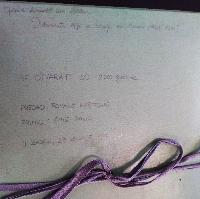The former chairman of the Zadar municipal committee, Romano Meštrović, extracted the documents on the mass movement of 1971 in Zadar as an ad hoc collection already in 1990. The archival materials testify to the local communist purges after the quelling of the Croatian national liberal movement known as the Croatian Spring. It mainly consists of different reports, assessments and the minutes of the inquiry panel, which investigated and accused the reformist Party members for nationalist, i.e., anti-socialist activities also in the cultural field. The city of Zadar and its communist leadership was considered one of the epicentres of the Croatian Spring, heavily criticised by Josip Broz Tito at the Karađorđevo meeting at the end of 1971.
-
Vieta:
-
Temos:
-
Įkūrimo data:
-
Charakteringi eksponatai:
The Matica hrvatska Collection is an excellent historical source for Croatia's cultural and political history. It is an archival collection created by the work of Matica hrvatska, a non-profit and non-governmental cultural organisation which became the central Croatian cultural institution in the Croatian national reform movement – the Croatian Spring. Matica gathered the Croatian intelligentsia that was dissatisfied with the status of Croatia within the Yugoslav federation. That is why the communist government began to treat Matica as an oppositional institution, a driver of oppositional political ideas and a rival to the League of Communists.
-
Vieta:
-
Zagreb Trg Marka Marulića 21, Croatia 10000
-
Temos:
-
Įkūrimo data:
-
Charakteringi eksponatai:
The Memory of Nations is an extensive online collection of the memories of witnesses, which is being developed throughout Europe by individuals, organizations, schools and institutions. It preserves and makes available the collections of memories of witnesses who have agreed that their testimony should serve to explore modern history and be publicly accessible. The collection includes testimonies of communism resistance, holocaust survival, artists of alternative culture and underground and many others.
-
Vieta:
-
Vodičkova 36, 110 00 Praha 1, Czech Republic
-
Temos:
-
Įkūrimo data:
-
Charakteringi eksponatai:
The Mihai Moroșanu Private Collection comprises various materials relating to the anti-regime activity of Mihai Moroșanu, one of the most famous Moldovan dissidents of the Soviet period, well-known for his staunch criticism of the regime and for his strong nationally oriented views. The collection consists of a number of personal files, interviews, photos and judicial materials relating to Moroșanu’s case, spanning the period from the early 1960s to the early 1990s. Due to his uncompromising resistance to the Soviet regime, Moroșanu is one of the very few authentic dissident figures in the Moldovan context.
-
Vieta:
-
Chișinău Strada Ismail 100/2, Moldova
-
Temos:
-
Įkūrimo data:
-
Charakteringi eksponatai:
The Miko Tripalo Collection testify to the activities of Miko Tripalo, one of the key personalities of the Croatian Spring - the liberal reform movement of Croatian communists, intellectuals and students who, with the widest public support, tried to initiate changes aimed at equality between nations and the democratisation of society in socialist Croatia and Yugoslavia. After the fall of the Croatian Spring in late 1971, Tripalo became one of the most prominent dissidents. He became a symbol of national resistance and the struggle for democracy. After the fall of communism, he became an active politician and a committed advocate of an open society and human rights. By the end of his life, he expanded his collection with new documents and manuscripts.
-
Vieta:
-
Zagreb Ilica 5, Croatia 10000
-
Temos:
-
Įkūrimo data:
-
Charakteringi eksponatai:





